Fleurs du Mal Magazine


Or see the index
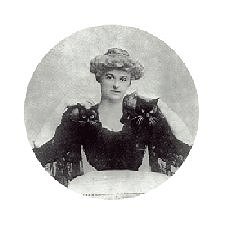
Renée Vivien
(1877-1909)
Your Strange Hair
Your strange hair, cold light,
Has pale glows and blond dullness;
Your gaze has the blue of ether and waves;
Your gown has the chill of the breeze and the woods.
I burn the whiteness of your fingers with kisses.
The night air spreads the dust from many worlds.
Still I don’t know anymore, in the heart of those deep nights,
How to see you with the passion of yesterday.
The moon grazed you with a slanted glow …
It was terrible, like prophetic lightning
Revealing the hideous below your beauty.
I saw-as one sees a flower fade-
On your mouth, like summer auroras,
The withered smile of an old whore.
Renée Vivien poetry
fleursdumal.nl magazine
More in: Archive U-V, Renée Vivien, Vivien, Renée
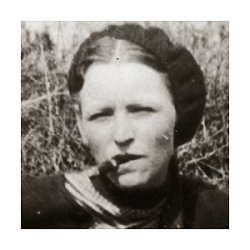
Bonnie Elizabeth Parker
(1910 – 1934)
Outlaws
Billy the Kid and Clyde Barrow
Billy rode on a pinto horse
Billy the Kid I mean
And he met Clyde Barrow riding
In a little gray machine
Billy drew his bridle rein
And Barrow stopped his car
And the dead man talked to the living man
Under the morning star
Billy said to the Barrow boy
Is this the way you ride
In a car that does its ninety per
Machine guns at each side?
I only had my pinto horse
And my six-gun tried and true
I could shoot but they got me
And someday they will get you!
For the men who live like you and me
Are playing a losing game
And the way we shoot, or the way we ride
Is all about the same
And the like of us may never hope
For death to set us free
For the living are always after you
And the dead are after me
Then out of the East arose the sound
Of hoof-beats with the dawn
And Billy pulled his rein and said
I must be moving on
And out of the West came the glare of a light
And the drone of a motor’s song
And Barrow set his foot on the gas
And shouted back, ‘So long’
So into the East, Clyde Barrow rode
And Billy, into the West
The living man who can know no peace
And the dead who can know no rest
Bonnie Parker
Outlaws — Billy the Kid and Clyde Barrow
Billy rode on a pinto horse
Billy the Kid I mean
And he met Clyde Barrow riding
In a little gray machine
Billy drew his bridle rein
And Barrow stopped his car
And the dead man talked to the living man
Under the morning star
Billy said to the Barrow boy
Is this the way you ride
In a car that does its ninety per
Machine guns at each side?
I only had my pinto horse
And my six-gun tried and true
I could shoot but they got me
And someday they will get you!
For the men who live like you and me
Are playing a losing game
And the way we shoot, or the way we ride
Is all about the same
And the like of us may never hope
For death to set us free
For the living are always after you
And the dead are after me
Then out of the East arose the sound
Of hoof-beats with the dawn
And Billy pulled his rein and said
I must be moving on
And out of the West came the glare of a light
And the drone of a motor’s song
And Barrow set his foot on the gas
And shouted back, ‘So long’
So into the East, Clyde Barrow rode
And Billy, into the West
The living man who can know no peace
And the dead who can know no rest
Bonnie Parker poetry
fleursdumal.nl magazine
More in: Archive O-P, Archive O-P, Bonnie and Clyde, Bonnie Parker, CRIME & PUNISHMENT
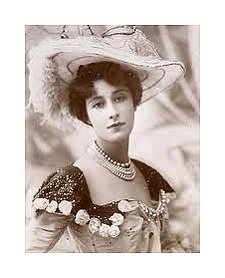
Renée Vivien
(1877-1909)
À une Femme
Tendre à qui te lapide et mortelle à qui t’aime,
Faisant de l’attitude un frisson de poème,
O Femme dont la grâce enfantine et suprême
Triomphe dans la fange et les pleurs et le sang,
Tu n’aimes que la main qui meurtrit ta faiblesse,
La parole qui trompe et le baiser qui blesse,
L’antique préjugé qui meurt avec noblesse
Et le désir d’un jour qui sourit en passant.
Férocité passive, âme légère et douce,
Pour t’attirer, il faut que le geste repousse :
Ta chair inerte appelle, en râlant, la secousse
Et l’effort sans beauté du mâle triomphant.
Esclave du hasard, des choses et de l’heure,
Être ondoyant, en qui rien de vrai ne demeure,
Tu n’accueilles jamais la passion qui pleure
Ni l’amour qui languit sous ton regard d’enfant.
Le baume du banal et le fard du factice,
L’absurdité des lois, la vanité du vice
Et l’amant dont l’orgueil contente ton caprice,
Suffisent à ton cœur sans rêve et sans espoir.
Jamais tu ne t’éprends de la grâce d’un songe,
D’un reflet dont le charme expirant se prolonge,
D’un écho dans lequel le souvenir se plonge,
Jamais tu ne pâlis à l’approche du soir.
Cendres et Poussières, 1902
Renée Vivien poetry
fleursdumal.nl magazine
More in: Archive U-V, Renée Vivien, Vivien, Renée
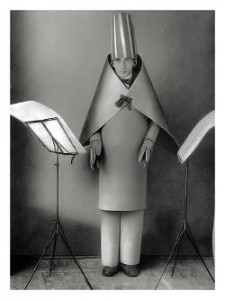 Hugo Ball: Totenrede für Hans Leybold (April 1915)
Hugo Ball: Totenrede für Hans Leybold (April 1915)
Hans Leybold — ich muß ihn ja gekannt haben! Wir führten an den Kammerspielen in München zusammen Hauptmanns »Helios« auf. Er war ein Student. Er machte mich mit der »Aktion« bekannt. Er negierte mein Gesäß. Er reizte mich maßlos.
Wir fanden einen kleinen Verlag in München. Der hieß Bachmair, H. F. S. X. Y. Bachmair. Anlaß vielen Gelächters für uns. Sprach Leybold: »Lasset uns eine Zeitschrift gründen!« Die hießen wir »Revolution«. Als die Zeitschrift gegründet war, verlangten die Abonnenten ein Programm. Leybold sprach: »Wohlan denn, Ihr —, wennschon immerhin: Hier habet ihr ein Programm«. Und schrieb: »Kampf gegen Seiendes, für Keimendes. Gegen Kunstportiere, Kulturportiere, Avenariusse, Scharrelmänner, Obskuranten, Schwärzlinge, Hertlinge, Hohlwege, Panteutschisten, Stagnaten, Kastraten. Gegen literaturbehaftete Oberlehrer, kunstsinnige Kritiker, allgemeine Rundschauer. In Summa: Gegen Zuständliches«. Und fügte hinzu: »Nichtschriftsteller heraus! Keine Literaten sollen gezüchtet werden«. Da hatte man denn die Revolution! Da war sie. 20 Jahre alt war der Kerl. Sehr hurtig. Und paffte einfach drauf los.
Sprach jemand in Berlin: »Was ist das für eine Revolution, die ihr da macht in München! Da steht ja kein Satz Politik drin!« »Richtig«, sprach Leybold, »da steht kein Satz Politik drin. Was soll man tun?« 5 Minuten später waren wir konfisziert mit Nummer I.
»Holla«, sagte ich zu ihm, »da steht nur kein Sozialismus, keine Altersfürsorge, kein Mutterheim, kein Rotes Kreuz drin. Und auch die Rosa Luxemburg wird nicht mitarbeiten. Noch Frau Zetkin«. »Aaber: Politik, zum Donnerwetter, Politik«, sprachen wir zweistimmig, »ist das etwas anderes als die Lehre von den Mitteln, mit denen man sich selbst oder eine Idee durchsetzt? Und wenn unsere Idee — na, sagen wir schon — ›der Geist‹ ist, ist es vielleicht unsere Politik, daß wir ›den Geist‹ durchsetzen?« Unter Geist verstanden wir aber alles, was gegen das Gesäß, gegen die Verdauung und gegen das Finanzherz gerichtet ist. Jeglichen Fanatismus im Gegensatz zu jeglichem Traum- und Innenleben. Jegliche Anarchie im Gegensatz zu jeglichem Bonzentum (sei’s, wer’s sei). Wir versuchten, das überlegene geistige Kaliber in unsere Hand zu bekommen und es spielen zu lassen. Wir suchten jede Handlung, jedes Unternehmen, jede Zeile Geschriebenes nur im Zusammenhang mit unserer Endabsicht zu ästimieren, für Komplexe empfindlicher als für Äußerungen. Für Wandlungen dankbarer als für »Charakter«. Unser Ziel aber hieß: Geistige Konspiration zwecks Ermöglichung geistiger Werte.
Inzwischen verspritzten wir Glossen und Gedichte, nach allen Seiten. »Die Revolution« verkrachte nach 5 Nummern. Leybold wurde nacheinander Mitarbeiter des »März«, des »Vorwärts«, der »Aktion«, der »Zeit im Bild«, der »Tat«.
Das Bedeutsamste, was er in dieser Zeit schrieb, scheint mir eine Glosse in »Zeit im Bild« gewesen zu sein. Dort vertrat er die Ansicht: »Es muß (in diesem Volk) immer etwas los sein. Immer etwas knallen, passieren. Immer wer angezaubert werden. Laut erhebet eure Stimmen, lauter, lauter. Der Zweck heiligt die Mittel«. Ein richtiger Jesuit, was? »Die Stillen im Lande«, meinte er, »werden nicht gehört«. Er meinte damit solche Herren Hermann Stehr, Gustav Landauer, Paul Boldt und andere.
Und es begab sich, daß uns der Einfall kam, Franz Blei zu propagieren. Wir fanden das sehr witzig. Blei hatte immer propagiert. Warum sollte er nicht selbst einmal propagiert werden? Also spielte er die Uraufführung seiner »Welle« in den Münchener Kammerspielen. Leybold programmatelte. Seewald inszenierte. Ich zeichnete verantwortlich. Wir bewarben uns um eine Theater-Direktion in Dresden. Wir versuchten das Münchener Künstlertheater in unsere Hand zu bekommen (wohl wissend, daß das Theater der springende Punkt ist). Wir planten eine internationale Anthologie von Lyrik. »Teufel, Teufel«, sagte Leybold, setzte sich in die Eisenbahn und fuhr nach Kiel.
Wir entspannen einen heftigen Briefwechsel. Er warb um mich, vorsichtig und höflich, wie um eine obszöne Frau. Wir erkannten einander und setzten ein Psychofakt in die Welt, das wir Baley nannten und das den Zweck hatte, Posen, Gesten, Vexationen zu kultivieren. Arrogant zu sein wie — wie Einstein.
Ich befreundete mich mit Kandinsky und ging zum Expressionismus über. Er seinerseits empfahl mir Heinrich Manns »Professor Unrat« zur Lektüre. Ich schrieb ihm:
»Wir, Bruder, toben mit den grellen Bumerangs, Trompetenbäume schrillen in Cis-Moll.
Wir schnellen durch die Luft gleich Fetzen grünen Tangs,
Blutäugig fliegende Fische voller Haß und Groll.«
Ich suchte ihn von Heinrich Mann und seiner Begeisterung für die Sachlichkeit abzubringen.
In demselben Moment erklärte Kaiser Wilhelm, daß das mit den Franzosen und Russen so nicht weitergehen könne. Und Leybold schwenkte auch die Fahne und blies auch ins Hifthorn und machte auch den Krieg mit Frankreich. Mir persönlich ist ja der Krieg unsympathisch, denn es ist eine Rigorosität, daß Leute wie Pèguy erschossen werden. Aber man kann nichts machen. Denn der Krieg ist eine Notwendigkeit Gottes. Dazu kam, daß Leybold eine Sympathie hatte für Kanonenrohre, weil sie ihn mit Freudschen Theorien erfüllten.
Doch hiervon genug. Sie werden wissen wollen, was dieser geniale junge Mann positiv geleistet hat. Nun denn! Er starb auf dem Felde der Ehre (viele Russen sterben anderswo). Er hat eine Zeitschrift gegründet, die einen sehr bedeutungsvollen Namen hat. Er pöbelte gegen Otto Ernst, gegen die Epigonen des Turnvaters Jahn, gegen Roda Roda, Feistritz, Walter Kollo und viele andere. Was an sich nichts bedeutet. Aber er faßte diese Insekten in Kristall, putzte sie auf, hing ihnen Schellen und Lendenschürze um, so daß mit der Zeit eine recht niedliche Negertruppe daraus geworden wäre.
Sodann: Er tat furchtbar viele Frauen auf: bei ihm eine Form der Propagierung des öffentlichen Lebens. Glich sich dadurch Ulrich von Hutten an. Dichtete:
Unglaublich viele schöne Frauen gibt es in der Stadt,
Sie haben blaßgepuderte Wangen und ziegelrote Münder,
Sie sind teils kränklich, teils gesünder,
Manche quellen über, manche werden niemals satt.
Er fiel Athleten an, Kunstturner, Studenten, Cafétiers und stiftete auf diese Weise eine Art abgekürzter Polemik. Er hielt es für ganz unwichtig, Literatur zu machen, und für sehr schwer, ein deutscher Schriftsteller zu werden, weil das eine contradictio in adjecto sei.
Aber das alles half ihm nichts. Eines Tages, mitten im Krieg, stürzte er vom Pferd, vor der Stadt Namur, kam zurück nach Berlin, pflanzte einen Vollbart ins Café des Westens und begab sich in seine Garnison Itzehoe, von wo er depeschieren ließ, er sei mit dem Tode abgegangen.
Es ist unerhört und scheußlich, daß dieser junge Mann aus dem Kriege nur die physische Konsequenz ziehen mußte, während die geistige ihm versagt blieb. Er ging ein (literarisch gesprochen). Er verendete (literarisch gesprochen). Er starb in irgendeiner Ecke, ohne einen Laut, und ohne daß er noch jemand gesprochen hätte. Fürs Vaterland. Aber er wollte hinaus aus dem Vaterland. Immer. Nur hinaus aus dem Vaterland. Mangel an Vaterland war direkt ein Defekt bei ihm. So war er geartet.
Ich sehe ihn vor mir, unbändig lachend. »Menschenskind, eine Totenrede?« Schon klemmt er das Monokel ins Auge, gibt seinem Körper einen Ruck und sistiert die Vorstellung. Oder auf der Straße: Er trägt einen blauen Mantel, geht mit verkniffenen, breitgeschwungenen Augenbrauen nach dem Tempo einer Automobilhupe und spuckt. »Alter Bulle«, sage ich zu ihm, »wir werden noch manchen Kampf miteinander zu kämpfen haben.« »Woll, woll«, sagt er, im raschen Gehen auf der Straße, während der Mantel fliegt.
Widersprechen Sie nicht! Kaufen Sie seine nachgelassenen Glossen und Gedichte, die ich herausgeben werde. Er ist hin. Es muß ihm sehr schwer gefallen sein, wie ich ihn kenne. Aber es ist nichts zu machen. Gedenken Sie seiner! Haben Sie Mitleid! Seien Sie freundlich! Sie alle haben seinen Tod mitverschuldet. Alle, wie Sie auch hier unten sitzen. Möge Ihnen sein Name einfallen, wenn Sie Ihre Kinder säugen!
Ich habe dem nichts hinzuzufügen.
Hugo Ball: Totenrede für Hans Leybold (April 1915)
fleursdumal.nl magazine
More in: Archive A-B, Archive K-L, Ball, Hugo, Hans Leybold, In Memoriam, Leybold, Hans
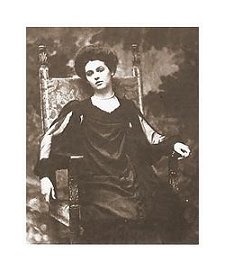
Renée Vivien
(1877-1909)
Roses Rising
My brunette with the golden eyes, your ivory body, your amber
Has left bright reflections in the room
Above the garden.
The clear midnight sky, under my closed lids,
Still shines….I am drunk from so many roses
Redder than wine.
Leaving their garden, the roses have followed me….
I drink their brief breath, I breathe their life.
All of them are here.
It’s a miracle….The stars have risen,
Hastily, across the wide windows
Where the melted gold pours.
Now, among the roses and the stars,
You, here in my room, loosening your robe,
And your nakedness glistens
Your unspeakable gaze rests on my eyes….
Without stars and without flowers, I dream the impossible
In the cold night.
Renée Vivien poetry
fleursdumal.nl magazine
More in: Archive U-V, Renée Vivien, Vivien, Renée

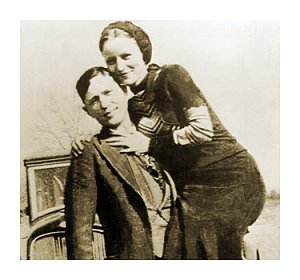
In Memory of Bonnie Elizabeth Parker (1910 – 1934)
Today, on 23 May 2014, it is exactly 80 years ago that outlaw Bonnie Parker was killed by the police (together with her friend Clyde Barrow). Bonnie Parker wrote poems since her schooldays.
A man can break every commandment
And the world will still lend him a hand,
Yet a girl that has loved, but un-wisely
Is an outcast all over the land.
Bonnie Parker
(fragment from the poem The Street Girl)
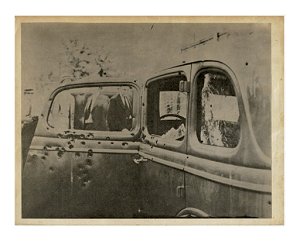
fleursdumal.nl magazine
More in: Archive O-P, Archive O-P, Bonnie and Clyde, Bonnie Parker, CRIME & PUNISHMENT, In Memoriam
Renée Vivien
(1877-1909)
Ta royale jeunesse a la mélancolie
Ta royale jeunesse a la mélancolie
Du Nord où le brouillard efface les couleurs,
Tu mêles la discorde et le désir aux pleurs,
Grave comme Hamlet, pâle comme Ophélie.
Tu passes, dans l’éclair d’une belle folie,
Comme elle, prodiguant les chansons et les fleurs,
Comme lui, sous l’orgueil dérobant tes douleurs,
Sans que la fixité de ton regard oublie.
Souris, amante blonde, ou rêve, sombre amant,
Ton être double attire, ainsi qu’un double aimant,
Et ta chair brûle avec l’ardeur froide d’un cierge.
Mon coeur déconcerté se trouble quand je vois
Ton front pensif de prince et tes yeux bleus de vierge,
Tantôt l’Un, tantôt l’Autre, et les Deux à la fois.
Renée Vivien poetry
fleursdumal.nl magazine
More in: Archive U-V, Renée Vivien, Vivien, Renée
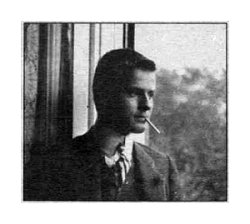
Hans Leybold
(1892-1914)
Auf einer Feldpostkarte
Zerflossen alles
in wirren Schaum,
mein Hirn ein weiter
luftleerer Raum.
Von außen schlagen
die Hämmer drauf:
mein Schädel ist
ein Kirchturmknauf.
Hans Leybold poetry
fleursdumal.nl magazine
More in: *War Poetry Archive, Archive K-L, Hans Leybold, Leybold, Hans

Photo by David Shankbone
In memory of Lucy Gordon
To One in Paradise
by Edgar Allan Poe
Thou wast that all to me, love,
For which my soul did pine—
A green isle in the sea, love,
A fountain and a shrine,
All wreathed with fairy fruits and flowers,
And all the flowers were mine.
Ah, dream too bright to last!
Ah, starry Hope! that didst arise
But to be overcast!
A voice from out the Future cries,
“On! on!”—but o’er the Past
(Dim gulf!) my spirit hovering lies
Mute, motionless, aghast!
For, alas! alas! with me
The light of Life is o’er!
No more—no more—no more—
(Such language holds the solemn sea
To the sands upon the shore)
Shall bloom the thunder-blasted tree,
Or the stricken eagle soar!
And all my days are trances,
And all my nightly dreams
Are where thy grey eye glances,
And where thy footstep gleams—
In what ethereal dances,
By what eternal streams.
20 May 2014: In memory of Lucy Gordon (22 May 1980 – 20 May 2009)
Photo Lucy gordon by David Shankbone: Lucy Gordon at the 2007 premiere of Spider-Man 3
(David Shankbone: Creative Commons Attribution-Share Alike 3.0 Unported license), 2007)
Tombeau de la Jeunesse – fleursdumal.nl magazine
More in: In Memoriam, Lucy Gordon, Poe, Edgar Allan
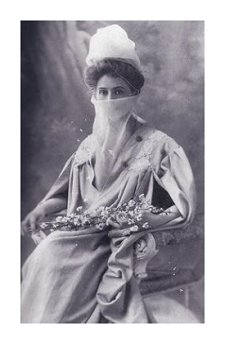
Renée Vivien
(1877-1909)
Prolong the night
Prolong the night, Goddess who sets us aflame!
Hold back from us the golden-sandalled dawn!
Already on the sea the first faint gleam
Of day is coming on.
Sleeping under your veils, protect us yet,
Having forgotten the cruelty day may give!
The wine of darkness, wine of the stars let
Overwhelm us with love!
Since no one knows what dawn will come,
Bearing the dismal future with its sorrows
In its hands, we tremble at full day, our dream
Fears all tomorrows.
Oh! keeping our hands on our still-closed eyes,
Let us vainly recall the joys that take flight!
Goddess who delights in the ruin of the rose,
Prolong the night!
Renée Vivien poetry
fleursdumal.nl magazine
More in: Archive U-V, Renée Vivien, Vivien, Renée
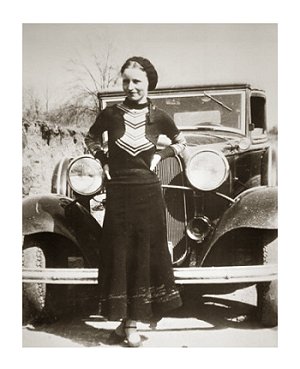
Bonnie Elizabeth Parker
(1910 – 1934)
The story of “Suicide Sal”
We each of us have a good “alibi”
For being down here in the “joint”
But few of them really are justified
If you get right down to the point.
You’ve heard of a woman’s glory
Being spent on a “downright cur”
Still you can’t always judge the story
As true, being told by her.
As long as I’ve stayed on this “island”
And heard “confidence tales” from each “gal”
Only one seemed interesting and truthful-
The story of “Suicide Sal”.
Now “Sal” was a gal of rare beauty,
Though her features were coarse and tough;
She never once faltered from duty
To play on the “up and up”.
“Sal” told me this tale on the evening
Before she was turned out “free”
And I’ll do my best to relate it
Just as she told it to me:
I was born on a ranch in Wyoming;
Not treated like Helen of Troy,
I was taught that “rods were rulers”
And “ranked” as a greasy cowboy.
Then I left my old home for the city
To play in its mad dizzy whirl,
Not knowing how little of pity
It holds for a country girl.
There I fell for “the line” of a “henchman”
A “professional killer” from “Chi”
I couldn’t help loving him madly,
For him even I would die.
One year we were desperately happy
Our “ill gotten gains” we spent free,
I was taught the ways of the “underworld”
Jack was just like a “god” to me.
I got on the “F.B.A.” payroll
To get the “inside lay” of the “job”
The bank was “turning big money”!
It looked like a “cinch for the mob”.
Eighty grand without even a “rumble”-
Jack was last with the “loot” in the door,
When the “teller” dead-aimed a revolver
From where they forced him to lie on the floor.
I knew I had only a moment-
He would surely get Jack as he ran,
So I “staged” a “big fade out” beside him
And knocked the forty-five out of his hand.
They “rapped me down big” at the station,
And informed me that I’d get the blame
For the “dramatic stunt” pulled on the “teller”
Looked to them, too much like a “game”.
The “police” called it a “frame-up”
Said it was an “inside job”
But I steadily denied any knowledge
Or dealings with “underworld mobs”.
The “gang” hired a couple of lawyers,
The best “fixers” in any mans town,
But it takes more than lawyers and money
When Uncle Sam starts “shaking you down”.
I was charged as a “scion of gangland”
And tried for my wages of sin,
The “dirty dozen” found me guilty-
From five to fifty years in the pen.
I took the “rap” like good people,
And never one “squawk” did I make
Jack “dropped himself” on the promise
That we make a “sensational break”.
Well, to shorten a sad lengthy story,
Five years have gone over my head
Without even so much as a letter-
At first I thought he was dead.
But not long ago I discovered;
From a gal in the joint named Lyle,
That Jack and his “moll” had “got over”
And were living in true “gangster style”.
If he had returned to me sometime,
Though he hadn’t a cent to give
I’d forget all the hell that he’s caused me,
And love him as long as I lived.
But there’s no chance of his ever coming,
For he and his moll have no fears
But that I will die in this prison,
Or “flatten” this fifty years.
Tommorow I’ll be on the “outside”
And I’ll “drop myself” on it today,
I’ll “bump ’em if they give me the “hotsquat”
On this island out here in the bay…
The iron doors swung wide next morning
For a gruesome woman of waste,
Who at last had a chance to “fix it”
Murder showed in her cynical face.
Not long ago I read in the paper
That a gal on the East Side got “hot”
And when the smoke finally retreated,
Two of gangdom were found “on the spot”.
It related the colorful story
Of a “jilted gangster gal”
Two days later, a “sub-gun” ended
The story of “Suicide Sal”.
Bonnie Elizabeth Parker (October 1, 1910 – May 23, 1934) and Clyde Chestnut Barrow (March 24, 1909 – May 23, 1934) were well-known (as Bonnie & Clyde) American outlaws and bankrobbers. They were both killed in a police ambush on May 23, 1934. Bonnie Parker wrote most of her poems, while in jail, in a little notebook she had obtained from The First National Bank of Burkburnett, Texas.
Bonnie Parker poetry
fleursdumal.nl magazine
More in: Archive O-P, Archive O-P, Bonnie and Clyde, Bonnie Parker, CRIME & PUNISHMENT, Suicide, Western Fiction
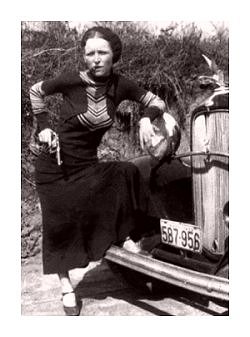
Bonnie Elizabeth Parker
(1910 – 1934)
The trail’s end
You’ve read the story of Jesse James
of how he lived and died.
If you’re still in need;
of something to read,
here’s the story of Bonnie and Clyde.
Now Bonnie and Clyde are the Barrow gang
I’m sure you all have read.
how they rob and steal;
and those who squeal,
are usually found dying or dead.
There’s lots of untruths to these write-ups;
they’re not as ruthless as that.
their nature is raw;
they hate all the law,
the stool pigeons, spotters and rats.
They call them cold-blooded killers
they say they are heartless and mean.
But I say this with pride
that I once knew Clyde,
when he was honest and upright and clean.
But the law fooled around;
kept taking him down,
and locking him up in a cell.
Till he said to me;
“I’ll never be free,
so I’ll meet a few of them in hell”
The road was so dimly lighted
there were no highway signs to guide.
But they made up their minds;
if all roads were blind,
they wouldn’t give up till they died.
The road gets dimmer and dimmer
sometimes you can hardly see.
But it’s fight man to man
and do all you can,
for they know they can never be free.
From heart-break some people have suffered
from weariness some people have died.
But take it all in all;
our troubles are small,
till we get like Bonnie and Clyde.
If a policeman is killed in Dallas
and they have no clue or guide.
If they can’t find a fiend,
they just wipe their slate clean
and hang it on Bonnie and Clyde.
There’s two crimes committed in America
not accredited to the Barrow mob.
They had no hand;
in the kidnap demand,
nor the Kansas City Depot job.
A newsboy once said to his buddy;
“I wish old Clyde would get jumped.
In these awfull hard times;
we’d make a few dimes,
if five or six cops would get bumped”
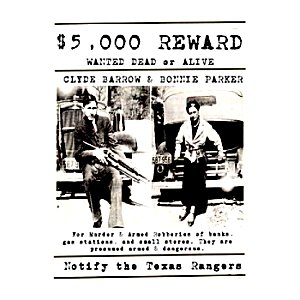
The police haven’t got the report yet
but Clyde called me up today.
He said,”Don’t start any fights;
we aren’t working nights,
we’re joining the NRA.”
From Irving to West Dallas viaduct
is known as the Great Divide.
Where the women are kin;
and the men are men,
and they won’t “stool” on Bonnie and Clyde.
If they try to act like citizens
and rent them a nice little flat.
About the third night;
they’re invited to fight,
by a sub-gun’s rat-tat-tat.
They don’t think they’re too smart or desperate
they know that the law always wins.
They’ve been shot at before;
but they do not ignore,
that death is the wages of sin.
Some day they’ll go down together
they’ll bury them side by side.
To few it’ll be grief,
to the law a relief
but it’s death for Bonnie and Clyde.
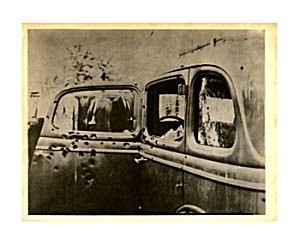
A few weeks before Bonny Parker was killed by 26 bullets from the police, she wrote this poem which she sent to her mother.
Bonnie Parker poetry
• fleursdumal.nl magazine
More in: #Editors Choice Archiv, Archive O-P, Archive O-P, Bonnie and Clyde, Bonnie Parker, CRIME & PUNISHMENT, Western Fiction
Thank you for reading Fleurs du Mal - magazine for art & literature